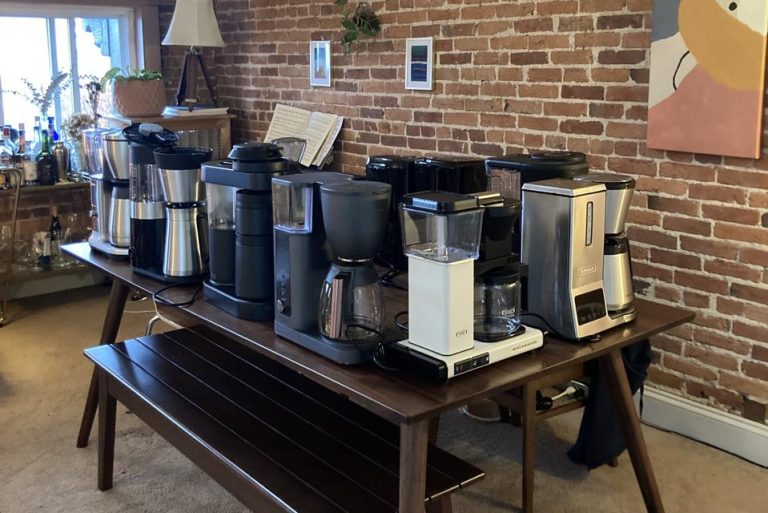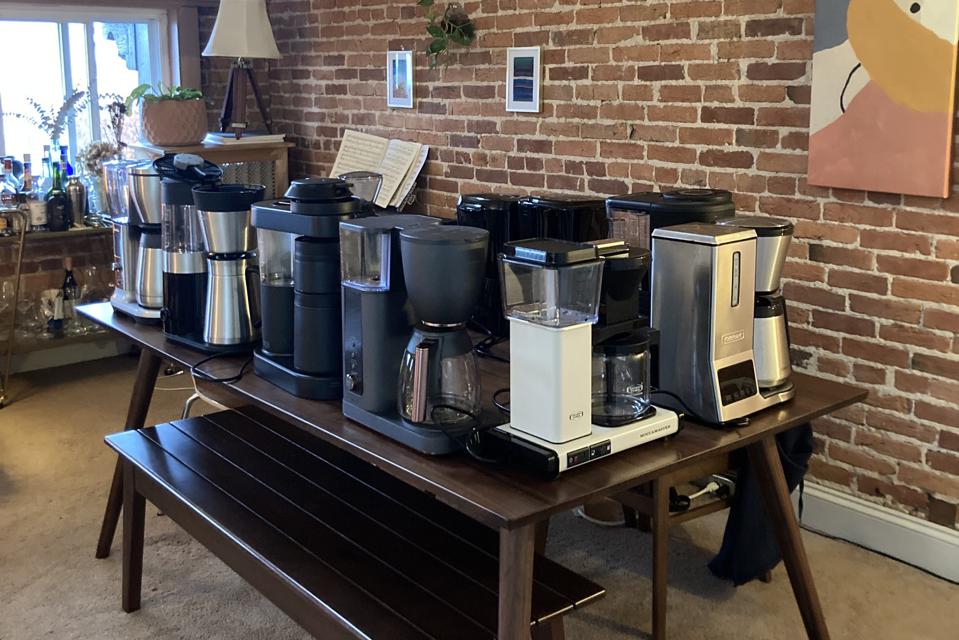
The materials of the coffee makers and filters matter when preparing a coffee that does not incorporate toxic substances.
- The best coffee maker for health
- Coffee maker with borosilicate glass
- Bisphenol A and phthalate-free coffee maker
- Filter coffee makers
- Espresso machines
- Compostable capsule coffee makers
- Cafeteria accessories
- Cups and thermoses to take the coffee

It is rare to find an adult who does not enjoy a hot cup at least once a day. Some people can’t get going without their caffeine fix and others enjoy it as a pleasurable daily ritual.
Choosing one variety of coffee or another will depend on our personal tastes. Organic coffee will always be preferable to ensure its quality. Fair trade and environmental criteria can also be assessed.
It is rare to find an adult who does not enjoy a hot cup at least once a day. Some people can’t get going without their caffeine fix and others enjoy it as a pleasurable daily ritual.
Choosing one variety of coffee or another will depend on our personal tastes. Organic coffee will always be preferable to ensure its quality. Fair trade and environmental criteria can also be assessed.
But beyond the content of the drink, the container where we infuse or make it also counts not only for the comfort, design or size, but also for the materials with which it is manufacturing.
THE BEST COFFEE MAKER FOR HEALTH
As in any kitchenware such as pans or casseroles, we flee from aluminum and plastic in contact with food, especially hot, because they can transfer toxic, and we bet on other kinder ones such as glass and stainless steel of good quality, ceramic and iron without heavy metals.
The market has evolved a lot and offers us numerous options to choose from: embolo or press coffee makers, manual or electric drip coffee makers, espresso machines for fire or automatic, manual or electric coffee grinders and all kinds of accessories for our drinks such as skimmers, sprinklers, glasses and thermoses to take away and much more to enjoy the “cup of pleasure” moment.
COFFEE MAKER WITH BOROSILICATE GLASS
One of these materials is borosilicate glass, of great transparency and quality, which is used in drip and plunger coffee makers, and in cups.
Borosilicate crystal is very resistant to temperature changes (it is suitable from -31ºC to 450ºC). It is non-porous and does not transmit any substance to the food it contains, despite reaching a high temperature or containing acidic or alkaline liquids.
Therefore, borosilicate, a material used in laboratory utensils, is the most recommended option for people with allergies or sensitivities, or for people who appreciate the maximum purity in materials.
In addition, it is completely neutral in terms of taste and smell and transparent: we can see the contents of our drink and it is increasingly included in modern and attractive designs.
BISPHENOL A AND PHTHALATE-FREE COFFEE MAKER
As for coffee makers, the most important thing is to make sure that all parts in contact with coffee are free of BPA, phthalates and other toxins. That rules out some of those considered more modern and publicized.
TYPES OF COFFEE MAKERS
Although coffee, since its inception, is made by pouring hot water over ground coffee, we can distinguish two major types of coffee makers: filtering and espresso. Among the espresso you can distinguish the Italian, the capsule and those with a container for ground coffee.
The difference between them is the pressure with which the water acts. In espresso machines the water is pushed by pressure, while in filter or filtered coffee the water falls by gravity. That’s why the preparation process takes a little longer. The first is a more intense and concentrated coffee, while the second is less powerful, but better captures the flavors and nuances of coffee.
FILTER COFFEE MAKERS
It resembles the stew coffee of grandmothers, but with more modern and comfortable containers.
Filter coffee makers work from top to bottom by automatic drip. The hot water passes through a filter filled with ground coffee and exits the filter turned into liquid coffee into a container at the bottom.
- In the Claudia and Julia online store you will find the Stelio Aroma WMF coffee maker to prepare up to 10 cups of coffee.
There are glass, steel or ceramic models and the filters can be permanent – of those same three materials – or disposable paper. The most recommended are ecological paper filters, unbleached and totally free of chlorine.
- We recommend the Brazil drip coffee maker, for sale at Conasi. It is made of borosilicate glass, both the jug and the support for the filter. You can get a 5% discount by entering the code BODY.
- In the Pour Over model, the filter is made of stainless steel and fine mesh. You won’t need disposable paper filters.
In this category we include piston coffee makers or French press, which are cylindrical containers that are covered with a plunger that when pressed separates the water from the coffee. They serve both to make coffee and tea because they act as an infusion.
ESPRESSO MACHINES
Italian coffee makers or mocha, which are heated on a fire so that when boiling the water rises and passes through the coffee located above, are very popular in Italy and Spain. The problem is that the vast majority are made of aluminum and it is difficult to find one that is completely made of stainless steel, including the filter. Moreover, they may contain plastic parts and are difficult to clean.
- In Espai René you will find the Long-Life mocha coffee maker from Ritinox, completely made of steel and made in Spain.
Electric espresso machines get much more pressure, which translates into a more intense and creamy coffee. In the high-end models you have to assess the pressure (from 12 to 15 bars), which can prepare one or several coffees automatically and also if you have a steam turbo, energy saving system or built-in grinder.
The more sophisticated they are, the larger they occupy and the higher their price. Remember that all espresso machines require regular maintenance to clean and decalcify the circuit.
These coffee makers can work with lose ground coffee or capsules. Obviously, plastic and aluminum capsules are not recommended, both for health and for the environment.
COMPOSTABLE CAPSULE COFFEE MAKERS
“It is not more sustainable who recycles the most, but who generates less waste.” If we are inspired by the zero-waste philosophy, capsule coffee makers will not be on our radar, but if you do not want to give up your comfort there is the option of using organic and compostable coffee capsules, which can be deposited in organic waste. There are also steel capsules that can be filled.
CAFETERIA ACCESSORIES
There are various accessories to enjoy a complete experience, from grinders to skimmers and dusters.
GRINDERS
With manual or electric grinders, you can drink a “fresh” coffee and choose the degree of grinding. BPA-free appliances with stainless steel blades with power to grind in a few seconds are preferable.
- We recommend this manual grinder with glass jar that you will find in Conasi, where you can get a 5% discount by entering the code CUERPOMENTE.
- If you do not want to hit the crank, in Planet Huerto you will find several BPA-free electric grinders.
SKIMMERS
The skimmers usually run on batteries and introduce you directly to the world of lattes, whether coffee, chocolate, matcha latte, pink latte or the entire range. The milk or vegetable drink becomes creamy in a moment, increasing the pleasure that the drink provides.
DUSTERS
The duster covers your coffee with a cloud of cinnamon, spices or almond powder evenly so that you fully immerse yourself in that time.
CUPS AND THERMOSES TO TAKE THE COFFEE
The same requirements that we demand for kettles and coffee makers are also applied in containers to take away and take away from home.
From stainless steel thermoses with all their parts free of toxins to reusable cups of steel, ceramic or glass to avoid the millions of disposable cups that arrive at landfills every day.
DO NOT THROW AWAY THE REMAINS OF THE COFFEE
If your goal is not to generate waste, coffee can be composted and recycled. Since coffee scraps contain many nutrients such as nitrogen, potassium and phosphorus, it can be used as fertilizer in the garden. But it also has many useful applications at home such as driving away ants, preparing an anti-cellulite peel, caring for lips, strengthening hair, repairing wood scratches, eliminating bad odors, cleaning pans and more.